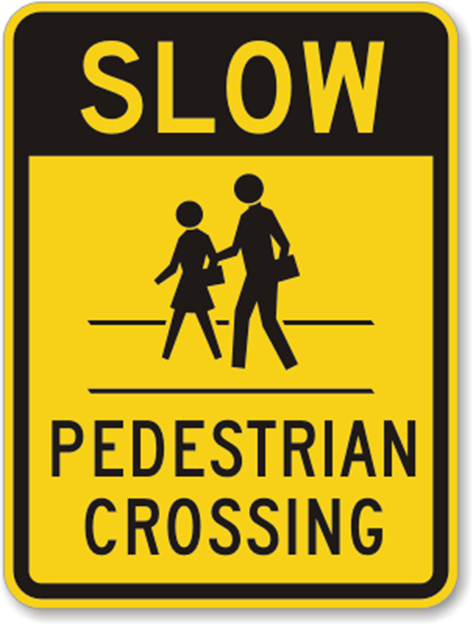
1. 25 MPH City-Wide Speed Limit
C. Rourke – Req. City Mgr. Have The DPD And The LPD Look Into Feasibility Of A City Wide 25 Mile Per Hour Speed Limit.
I was pleased to see this idea back before the council. In 2018, then Councilor Karen Cirillo (remember her?) filed a similar motion:
MOTION OF 12/11/18 BY COUNCILOR CIRILLO REQUEST CITY MANAGER HAVE PROPER DEPARTMENT REVIEW ROADWAYS IN THE CITY IN ORDER TO TAKE ADVANTAGE OF THE NEW STATE LAW, CHAPTER 90,
SECTION 17C, ALLOWING COMMUNITIES TO LOWER SPEED LIMITS ON BUSIER ROADS
The motion response in 2018 read, in relevant part:
The Massachusetts state legislature created an ordinance that can be adopted by a municipality to create a town-wide or business-district 25 mph speed limit. Cities and towns have the option to opt-in to MGL c. 90 § 17C, reducing the statutory speed limit from 30 mph to 25 mph in thickly settled or business districts. Statutory speed limits exist in the absence of special speed regulations. MGL c. 90 § 17 dictates that if no official speed postings have been made per MGL c. 90 § 18, then drivers are expected to travel at speeds that are reasonable and proper. In the City of Lowell (roads within thickly settled or business districts), the reasonable and proper rate of speed is 30 mph.
12/13/18 memo from Diane N. Tradd, Assistant City Manager/DPD Director
Currently, the downtown speed limit is 25 miles per hour, while the city-wide limit remains 30 miles per hour. Obviously, these limits do not apply to all roads, as some roads are governed by state law (ie: Rt. 110/Chelmsford Street; Rt. 133/Andover Street, etc.). Time and again this term, we have seen calls by citizens for more traffic-calming measures. This council should be commended for brining these traffic-calming initiatives forward as they are sorely needed. Sadly, a recent WalkBoston analysis of pedestrian deaths during 2021 that found most fatal crashes that killed pedestrians last year were concentrated in only 12 cities and towns across the Commonwealth. Almost one third of those deaths (24 of 75) occurred in just four cities: Springfield, Boston, Brockton and Lowell.
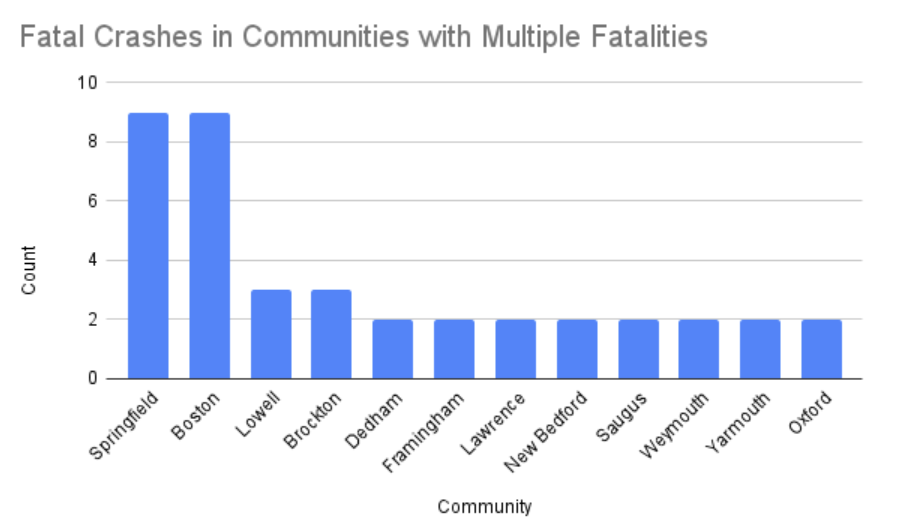
A city-wide reduction in the speed limit could go a long way in reducing these fatal accidents. There is a direct correlation between vehicle speed and your odds of surviving a collision:
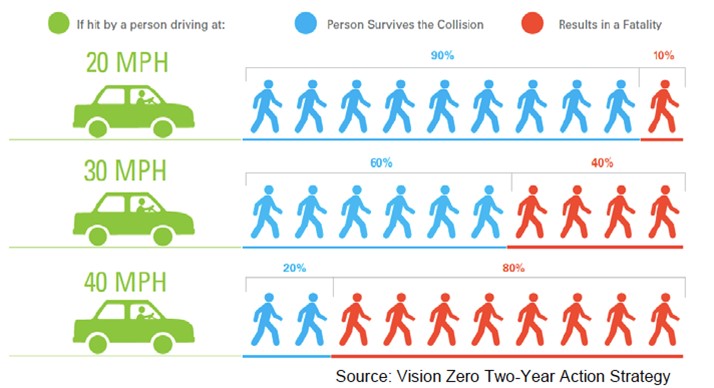
2. Enterprise Fund – Parking
An enterprise fund is a self-supporting government fund that sells goods and services to the public for a fee. The City currently has enterprise funds for parking, water and wastewater. If you’re a fan of reading municipal budgets (and really, who isn’t?), you know that our parking enterprise fund is in the red and is projected to remain there. The difference between fund receipts and expenses is made up from the tax levy. Thus, whether you use a vehicle or not, you will be paying for someone else’s car storage downtown.
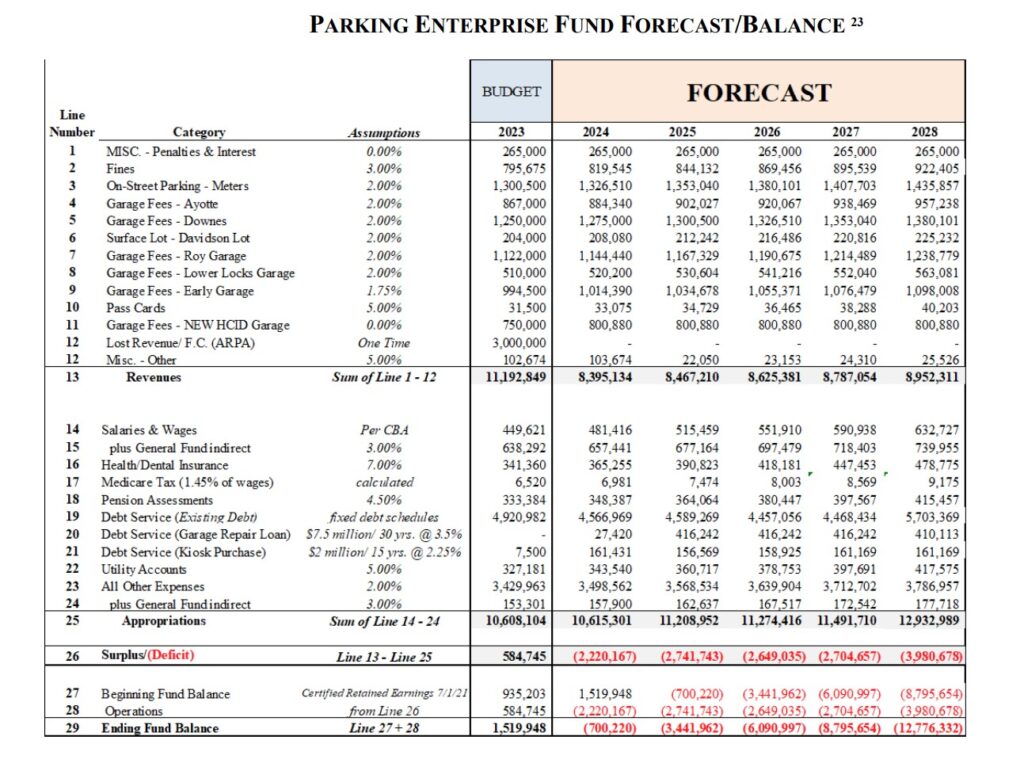
A discussion relative to reducing parking fees in garages for business owners and their employees gave insight into the problem.
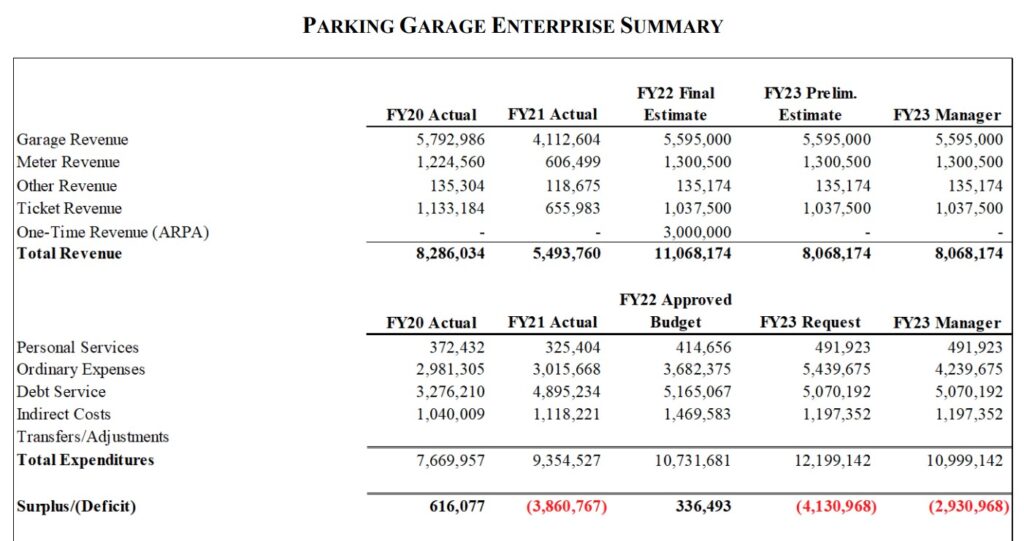
Currently, rates are tied to the consumer price index. As per the motion response:
Parking rates in the city owned parking garages are set by ordinance 266-12xC (6/12/2018) and are
adjusted annually based on the Consumer Price Index (CPI). Rates are not allowed to be lowered
and are to be rounded to the nearest quarter.
As of July 1, 2022 the rates will increase 8.3%, increasing the Market Rate Pass from $96.00 to
$104.00 per month, an increase of $8.00 per month.
The Group Rate, typically known as the Business Rate, is calculated by using 81% of the Market
Rate and will increase from $78.00 to $84.00 per month, an increase of $6.00 per month.
The increase in CPI is not sufficient to keep up with parking expenses. With calls from Councilors to lower garage parking rates and non-stop requests for free parking, I fail to see how we will escape the red with our current mindset.
Hopefully, the city will begin to institute some changes in the way we price parking. A separate but related motion response up for discussion was an update on new on-street parking meters. It looks like a new system will be rolled-out by the end of summer.
It would be a shame if our new meters are unable to accommodate a dynamic pricing model – where rates are adjusted (in real time) based on demand. Dynamic pricing would enable the city to generate maximum revenue from its parking assets and would hopefully help to move our shaky enterprise fund out of the red.
3. Enterprise Fund – Trash
C. Scott – Req. City Mgr. Investigate The Feasibility Of Creating An Enterprise Fund For Trash/Recycling.
The city does not currently have an enterprise fund for trash and recycling. However, these services are an eligible municipal charge for enterprise fund accounting. The question is whether it would be a good idea to move to this model.
What amounts to a flaw in the way we subsidize parking, actually works pretty well when it comes to trash and recycling. Currently, user fees pay a portion of our collective tax bill, with the remainder covered by the tax levy:

However, under an enterprise fund, the full cost (in theory) would be covered by user fees:
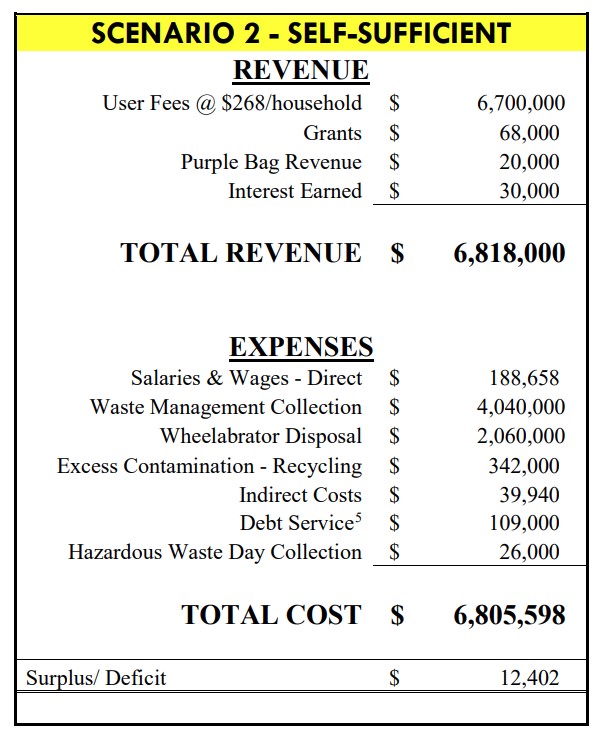
An enterprise fund arrangement would hit lower income citizens harder as they would be paying the same rate for trash pick-up as high-income earners. Unlike parking subsidies, I would argue that there is greater public benefit in trash removal and recycling. As such, I would prefer that we stick to at least partial payment for these services from the general fund.
4. ARPA Funds and Lowell High Cost Overrun
Remember way back in March when a $38,568,011 Covid-related cost-overrun was the biggest issue in the city? Remember the table-pounding and calls for blood? Remember the meeting on March 29, 2022?:
Working with Rep. Trahan’s office, the city received a verbal opinion from the U.S. Department of Treasury that use of ARPA funds would be permissible to cover for the increase. Further, it is also possible that there may be a path forward on the state share of the project cost as well.
Blog Post of 3/30/22
If you remember these things and were hoping that these efforts have continued under the new manager, last night was a bit of a let-down. When pressed by Councilor Gitschier as to what was happening on this front, it was clear that the answer was nothing. Hopefully the manager and his team were simply caught off-guard by the question and have better answers in the weeks to follow.
